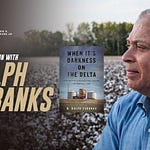When I was a teenager, I desperately wanted to leave home. I suppose I was no different than most. I longed for independence. Dreamed of what it would be like to be an adult. Most of all I wanted to escape my father’s rules. To be honest, I wanted to escape him. He cast dark shadows back then. And I didn’t want to live under them anymore.
I left home when I was 16 years old, made my way to Morehouse College, and I didn’t look back. My father was lost in a fog of bad memories. Mississippi became an abstraction, an artifact of a history that I studied and taught. Not something in me – a lie I told myself as I desperately sought to bury the place and the people who shaped me in my formative years. A lie that hid something I felt intimately: that deep down inside I was a frightened little country boy desperate to figure out, or to discover, who I was.
After graduate school, I found myself teaching at Bowdoin College in Brunswick, Maine. Cold and decidedly New England, this was not Mississippi. I was running so fast and far from Moss Point, I thought I would end up in Canada. But no matter how far I ran or how hard I tried to repress or ignore home, I could not escape the fact that Mississippi was in me. That fact would explode in my dreams, would reveal itself unexpectedly when I spoke certain words, and showed up when I barbecued outside during those beautiful Maine summers while listening to Bobby Blue Bland or Al Green.
Baldwin was right. “In America, the color of my skin stood between myself and me.” But there was something else. Experiences that were touched by color but not reducible to it shaped how I saw the world. Some of those experiences deposited a fear in my gut that sent me running. Others guided my eyes, informed my tastes, and taught me important lessons about decency and love. I finally understood an insight that Baldwin offered in the introduction to Nobody Knows My Name, “that the question of who I was was not solved because I had removed myself from the social forces which menaced me—anyway, these forces had become interior…. The question of who I was had at last become a personal question, and the answer was to be found in me.”
Moss Point, Mississippi, is a small coastal community. Known as the river city, the town now has about 13,000 residents. Bayous are everywhere. Majestic Oaks and Magnolia trees with Spanish moss hang from outstretched tree limbs — at least those that have survived the storms. The trees line the street behind the only high school in town. Classic and quaint southern homes with porches and American flags sit back from the road that takes you to Main Street and then to Interstate 10. Nothing too big. It is not a town of visible opulence. Just hard-working people trying to live and flourish. Some people make it. Others struggle to make ends meet. The majority of them are Black.
I never really paid attention to the beauty of Moss Point. My memories were mostly sensory: the pungent smell of the Porgy plant and the Paper Mill; the horrible horse flies that swarmed around your head during unbearable Mississippi summers. Of course, there were other memories: running behind the mosquito truck, the baseball games in the Dixie Youth League, the school trips for YMCA youth legislatures, the pick-up football games in the open lot.
I didn’t realize how much I needed to go home. To see it with these aging eyes of mine. And what I saw this past week, even with the remnants of destruction from a recent tornado still visible, was the stunning beauty of home and its people. Love, kindness and celebration. I needed the love of my family. To pull mom and dad closer. They have slowed down. Their steps aren’t as confident. My dad has softened over the years. His eyes reveal a vulnerability; his smile offers a glimpse of a gentle, beautiful soul. To hear him say to me, “I love you now. Take care of yourself,” feels, every time, like a new baptism – to be born again. No more dark shadows.
I have always valued the act of self-creation: that the circumstances of one’s life (that we did not choose) do not limit who and what we can become. But running away from Mississippi all those years ago — from my home — I neglected to see how much of the most important pieces of Moss Point had always stayed with me. The unexamined life is not worth living, and that examination begins with wherever you call home. Moss Point is in me. That sense of decency, a concern for the least of these, an insistence on treating people with kindness began in this little town on the coast of Mississippi, with its salted air and peaceful bayous with hauntingly beautiful Cypress trees.











